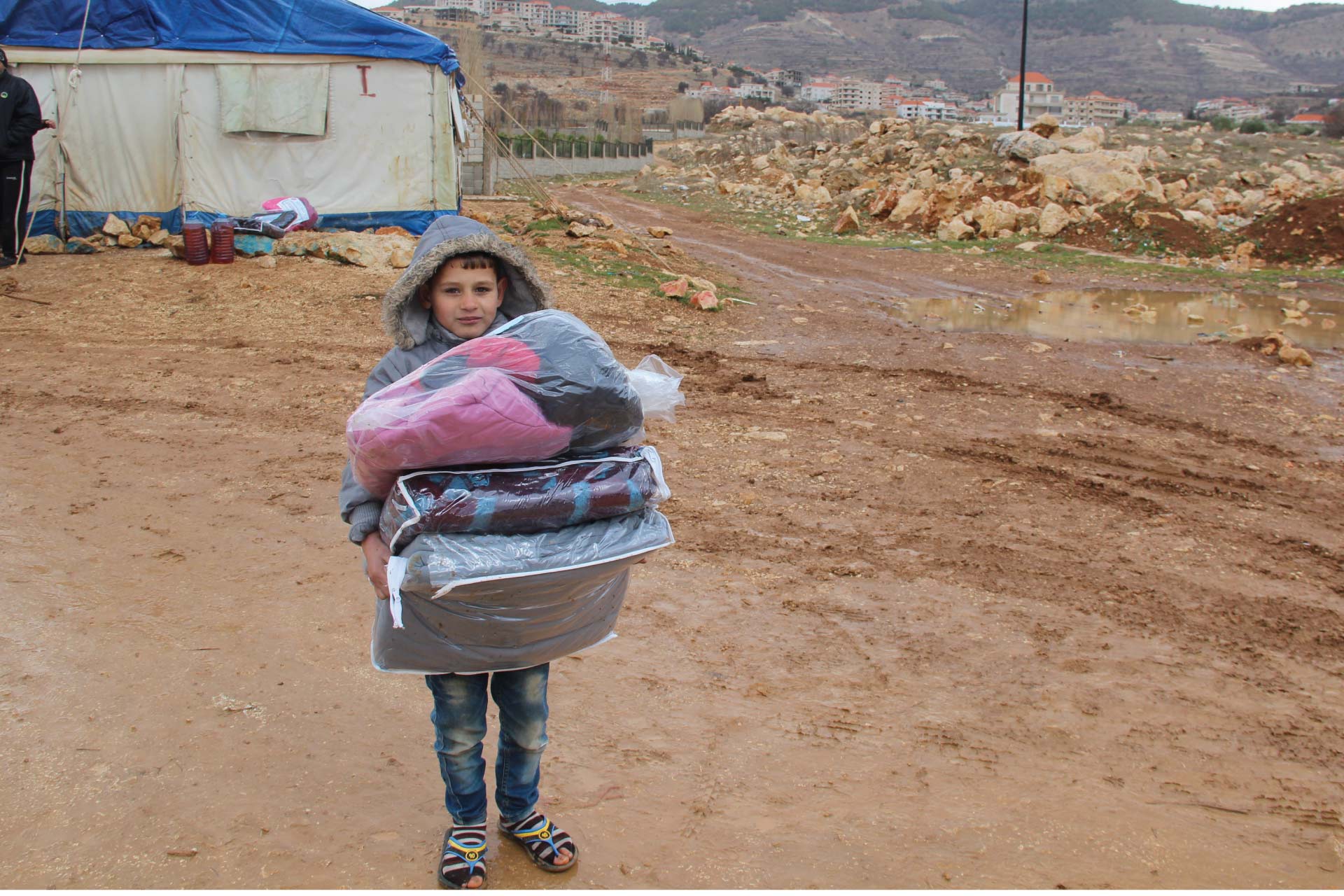Poor families in Lebanon suffer from truly deprived living conditions, and none more so than the over one million Syrian refugees who arrived in Lebanon after fleeing war in their homeland. Today, over one-third of Syrian refugees do not reside in residential structures, with the majority of these living in tents, leaving them at the mercy of powerful storms and bitter cold during Lebanon’s harsh winters. At the same time, 36% of refugees dwell in substandard and/or dangerous living conditions. Living conditions are generally poorest amongst female-headed households, as widowed refugees are often left with little to support their children after the father of the family passes away. What is worse, the current economic crisis is causing refugees to move out of houses and into tents, forcing them to accept overcrowded, deprived living conditions because they are no longer able to make rent.
Not surprisingly, poor health is closely linked to deprived living conditions; in fact, poor living conditions are one of the main causes of chronic and acute illness in Lebanon, and illness is most widespread amongst those refugees living in tents and other non-permanent structures.
In addition to issues of shelter, many families cannot afford basic commodities such as blankets, winter clothing, or school supplies for their children. In addition to being a barrier to good health, this can also prevent children from receiving an education, as many poor families cannot afford to purchase shoes or uniforms for their children, one of the basic requirements of the public school system for a child to be allowed to attend. The economic crisis currently facing the country has exacerbated this situation, pushing an additional 200,000 Lebanese people under the poverty line just since 2016. Inflation has caused the price of food and other basic commodities to increase dramatically, making it difficult for families to purchase even the basics they need to survive.
Why shelter and basic assistance?
The fact that poor living conditions are the country’s strongest determinant of poor health means that by improving shelter and providing families with basic household commodities, we are also impacting community health. By helping children get the required clothing and supplies they need to enter school, we are increasing their access to education. We can even help children experience the happiness of Eid by presenting them with Eid clothing and gifts for the holidays. Ultimately, our shelter and basic assistance programs aim to ease suffering and improve basic standards of living, thereby enhancing community development and sense of well-being.
Shelter and basic in-kind assistance at ISWA
- Dar-e-Salam and Al Iman Residences
These two residences, both located in Saida, were established to provide shelter for orphaned Syrian refugee children and their families, giving them a safe place to live while preserving their family environment. ISWA renovated the Dar-e-Salam building and opened it to refugees in 2014, providing them with a sanitary residence while connecting them to health and other services. The building currently housing Al Iman was renovated and then donated to ISWA, and the organization is now directly responsible for the administration of both residences.
- The winterization program
Winter often becomes a fight for survival against the elements for Lebanon’s poor, especially refugees living in tents. To ease their suffering, during autumn of each year ISWA helps Syrian refugees living in camps prepare for the coming winter, distributing basic commodities including food, blankets, winter clothing, fuel, tent materials, mattresses, and pillows.
- Providing vulnerable children with school supplies, uniforms, and winter clothing
Many families have difficulty covering the costs of supplies and appropriate clothing for their children to attend school. ISWA identifies children in need, providing them with backpacks, notebooks, and other school supplies. In addition, uniforms and winter clothing for the children are tailored at ISWA’s Al Umm Tailoring Factory.
- Souq al Kheir -- a market for free and low-cost clothing
Shopping at a mall is a luxury many cannot afford. Souq al Kheir not only provides people with free and low-cost clothing, but it grants them the power of choice through the experience of shopping. The market is stocked with clothing, either second-hand items donated to the program or items produced at ISWA’s Al Umm Tailoring Factory. Beneficiaries are then provided with vouchers and invited to shop at the market, taking second-hand items for free and new items for a maximum of three dollars each.
- Eid clothing and gifts for orphans and children in need
We at ISWA believe that all children should be allowed to experience the joy of Eid, no matter what their circumstances. The organization distributes Eid outfits and gifts to vulnerable children, inviting them and their families to celebrate Eid at community events.
A few of last year’s highlights in the Shelter and Basic Assistance Sectors
- Supporting orphan children in their family environment by providing 273 Syrian orphans and their families with safe, sanitary living conditions at Dar-e-Salam and Al Iman Residences, while also ensuring that they are linked to health and other services.
- Enhancing resilience amongst Syrian refugees during the winter months by distributing winterization kits to 28,900 households throughout Lebanon.
- Sponsoring the education of 1,175 Syrian refugee students in 11 private schools throughout Lebanon, including the purchase of school supplies.
- Providing 2,085 needy students with winter clothing
- Bringing the joy of Eid al Fitr to 508 orphans and other children in need by presenting them with Eid clothing and gifts.


